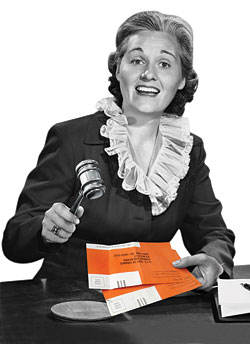
SCENARIO ONE: You Got Busted
The most common wiggle area is to catch errors on the ticket. Did the agent jot down the wrong make or model (i.e., Hyundai instead of Honda)? Is there a digit missing or transposed letters on the VIN number? Same goes for an inaccurate date, time, or location of your parked car; everything needs to be perfectly recorded except the car’s color, which is more difficult for traffic agents to assess and therefore gets more latitude from judges. Even if all the information on the ticket is accurate, plead “not guilty” anyway, says Haskell Nussbaum, former judge and author of Beat That Parking Ticket. Take advantage of the city’s ticket-settlement program, which essentially acts as an olive branch to violators. Many contested tickets will be decreased by about 30 percent, depending on the violation. Once you get your settlement offer back, you should probably accept it, says Nussbaum. If you reject the city’s onetime compromise and instead request a formal hearing in front of a judge, your chances of seeing the original penalty dismissed outright are even smaller. Only 22 percent of contested tickets are eventually waived.
SCENARIO TWO: You’re in Limbo
Maybe the meter malfunctioned. Or the NO PARKING sign was stolen. Or your Muni-Meter receipt fell off your dashboard. It’s possible that you can get the ticket dismissed, but you need solid proof. If you’re claiming there was no clearly placed sign, take pictures of the entire block—corner to corner—including street signs and all regulation signs, plus a picture of your car (zoom back far enough to show your exact parking spot). If you’re claiming a broken meter, photograph the meter and your car in front of it. Other things to collect: Muni-Meter receipts and eyewitness testimonies (say, a hot-dog vendor who saw the ticket being issued or a passenger you were pausing to pick up). The goal is to remove any doubt about your story. If you lose your trial, you can appeal the verdict; but unless you can produce new—and better—evidence, you’re not likely to have any more luck.
SCENARIO THREE: You’re Innocent
If you have a rock-solid defense (your car broke down, say, or you had a medical emergency—the closest thing to a get-out-of-jail-free card) and proof that your ticket was issued incorrectly, you might have a better chance of appealing directly to a judge. Trials are on a first-come first-served basis at the Finance Business Center in each borough. To prepare, read the city-provided “Got Tickets?” booklet carefully (available at nyc.gov), homing in on the arguments that judges consider valid for your specific defense (try “I was fifteen feet from that fire hydrant, and here is a photo, your Honor”). Bring all your evidence and vehicle registration within 30 days of the ticket-issue date, and get in the ticket-dispute line. (Bring a book, too; wait times are notoriously long.) Prepare a clear, concise oral argument in advance, eliminating phrases like “as I remember it” and “in my opinion.” You’ll only get a few minutes in front of a judge. There’s no dress code, but a neat ensemble and a pleasant attitude can’t hurt.
FYI Five Minutes of Mercy
Starting this week, Muni-Meter feeders and alternate-side parkers will get a five-minute grace period before ticketing starts. It’s a small gift from the City Council, which overrode a mayoral veto back in December.